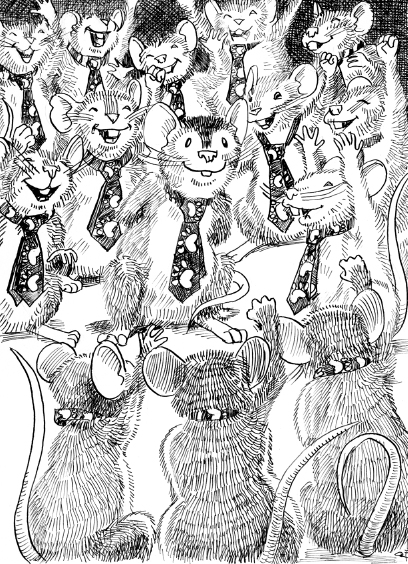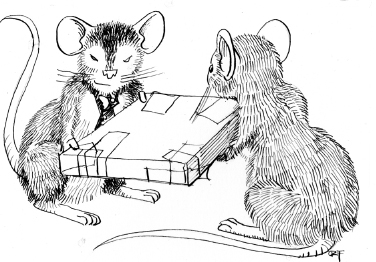Showdown in Crittertown (8 page)
Read Showdown in Crittertown Online
Authors: Justine Fontes
The clerk went back to sorting. “It's probably just someone with the same name.”
Later that day, when the school secretary bought stamps, we found out it was
the
Arthur Kingston. She said, “He attended Crittertown Elementary School until his family moved out of state. He didn't graduate in Maine and wasn't born here, so he isn't known as a Maine artist.”
Mike listened as the secretary chattered on. “After he received Mr. Clark's letter, Mr. Kingston dug out some drawings he did while he lived in Crittertownâand he's donated them to the school. Principal Clark plans to hold an auction at the crafts fair. He's going to send letters to all the summer people to see if they want to bid on âthe early works of Arthur Kingston.'”
Mike exclaimed, “Well, that's wicked decent of him. I wonder if the auction will raise enough money to repair the school.”
The secretary smiled. “I hope so! Because the Lakeville secretary has more years on the job, and a combined school won't need two secretaries.”
Mike assured her that even if the schools merged, she would most likely “land on her feet.”
“I'm not a cat,” the secretary said. “But I suppose I'll manage somehow.”
“What does she mean?” Nilla asked.
I'd read in
Cat Fancy
magazine that when cats fall, they usually land on their feet. But what that had to do with the secretary keeping her job or finding another was beyond me.
I suggested, “While Mike's busy, should we get the crackers?”
Grayson chuckled. “Is cheese all you think about?”
I didn't want to admit I was actually thinking of Poetry. I made sure Grayson didn't see me tuck one of the crackers in a plastic bag that used to hold pumpkin seeds. When we went back to the basement, I hid the bag under my nest.
I knew Grayson would soon be busy training for the Mouselympics. He and his more athletic friends had cleared a track around the edge of the basement.
These mouseletes raced around the track until they made the rest of us dizzy! They used pencils and old ledger books to practice pole vaulting. An old ruler measured their progress in the broad jump.
While Grayson was jogging and jumping, I used cardboard and tape to make a box big enough for the cracker. Then I wrote a note to the children about the Mouselympics.
Between races I heard Grayson tell his grandfather, “We don't need a war to beat the library colony!”
Brownback winked at me again.
Grayson asked, “Don't you want to train, too, Cheddar? I know you can run fast.”
Nilla chuckled. “You sure sprinted the day we explored the market!”
“That was different,” I said, shuddering at the memory. I'd been terrified! “If I'm not running
to
some cheese or
away
from a cat or other danger, it's hard to get my paws moving.”
Grayson giggled. “Maybe we need to add a cheese-eating contest.”
I smiled. “Now that's an event I could sink my teeth into!” For a moment, I was lost in a cheese-flavored dream.
Then several small paws tugged my attention away from that delicious vision. Charlie and some of the other Critter Post recruits squeaked, “We want to be in the Mouselimpers, too!”
“Mouselympics,” I said. “But it's only for grown-ups.”
Charlie grumbled. “Everything's only for grown-ups. Can't we help?”
I looked at Grayson. He shrugged and ran off to join the other mouseletes racing around the track.
Charlie asked, “Why aren't you running?”
“Cheddar's too fat,” a bony young recruit muttered.
Charlie pulled the skinny mouse's tailâand I didn't stop him. But I did prevent further fighting by saying, “There
is
something important we can all do. Every sporting event needs a cheering crowd. We can make signs and pom-poms to cheer on the post office colony.”
I briefly wondered if the recruits would go for this idea, or if they'd insist on holding a junior Mouselympics. Then suddenly my ears filled with high-pitched squeaks. “Yay, Cheddar!” “Yay, us!” “Yay post office colony!”
We spent the rest of the morning turning scraps of shiny paper and string into pom-poms. Then we made up a simple cheer.
It was so simple that even the youngest recruits could recite it. We practiced until my ears ached, and we could shout the cheer more-or-less together while shaking our pom-poms.
That afternoon April's garage was just as noisy. After reading my note about the Mouselympics, the children became as excited as the mouseletes and the Critter Post recruits. All the kids squeaked at once.

“Let's make miniature sports equipment!”
“We can use pipe cleaners or maybe Popsicle sticks for hurdles!”
“I'll make a balance beam!”
“We can use pot holders for gym mats.”
Jill told Grayson, Nilla and me, “You mice can keep one set of equipment for your games. We can sell all the others at the fair as âdollhouse playground equipment.'”
Wyatt and Andy built a basketball court. Grayson, Nilla, and I had fun testing the hoops.
While we were catching our breath, I asked the kids if they knew about Arthur Kingston. Then I told them what we overheard in the post office.
Javier said, “I'll look him up in my art books!”
The next day, Mrs. Olson handed out a flyer about Mr. Kingston and the auction. She couldn't understand why the children already seemed to know about the artist.
Later, in April's garage, Tanya did her Mrs. Olson imitation again. “I had no idea Kingston was so well-known among young people. Even
I
didn't know he'd spent part of his youth in Crittertown.”
Tanya laughed. Then she added in her own voice, “You should've seen her face when Javier started rattling off facts about Kingston's career.” In Mrs. Olson's voice she added, “Why don't you write a report to be part of the auction exhibit?”
Javier groaned. “Just what I needâanother homework assignment when I'd rather be drawing!”
“I can help you,” April whispered.
Javier smiled. “That'd be great!”
When the children took a break from their crafts, April asked Javier to repeat what he'd learned about Arthur Kingston. Then she arranged it in paragraphs.
Recalling the grammar lesson from our days at school, I made sure each sentence had a noun, a verb, and a sprinkle of punctuation. By the time the report was finished, we all felt rather proud of it.
To our surprise and delight, this short report was printed in the local newspaper, along with the notice about the upcoming auction and fair. According to the paper, “Depending on his schedule, Mr. Kingston might attend.”
When he read that, Javier whooped so loud that Buttercup nearly jumped out of his fur. Grayson, Nilla, and I laughed.
I told the loud dog, “Now you know how Dot feels!”
Nilla grumbled, “She deserves every bark!”
Javier gushed, “Wouldn't it be cool if I could meet Mr. Kingston and get his autograph and maybe even show him my sketchbook?”
Nilla tapped my shoulder. “What's an autograph?”
I shrugged and suggested, “Maybe we can stop by the library to ask Dictionaries.”
I was eager for a chance to present Poetry with the cheese cracker.
As if reading my mind, Grayson asked, “What's in that box you've been carrying around?”
“Nothing,” I fibbed. “It's just a box I made for Poetry. Sheâ¦likes boxes. So I made one for her.”
Grayson nodded. “Cheddar has a crush.”
“What's a crush?” Nilla asked.
Grayson replied, “It's when a mouse who usually only cares about cheese suddenly starts thinking about Poetry.”
We expected General History or at least some of his scouts to greet us outside the library. But we squeezed through the narrow passage into the basement before anyone noticed our arrival.
Grayson remarked, “No guards on duty?”
As before, Cookbooks' keen nose alerted the colony to our presence. “I smellâ¦post office mice!” she said.
Travel rushed forward to embrace us. The tall mouse insisted on kissing us each first on one cheek and then on the other. She explained, “It's how they greet one another âon the continent.'”
Nilla was puzzled. “On the condiment?”
“Continent,” Grayson corrected. Then he muttered, “But I still have no idea what she's talking about.”
Cookbooks asked, “Are you here to see Nonfiction?”
I shrugged. “Nothing formal, just stopping by on our way home from making crafts with the children.”
Nilla added, “Is Dictionaries around? I want to know what an autograph is, and maybe he can remind me about the difference between condiments and continents.”
Grayson sighed. “One is stuff like ketchup and mustard, the other is a giant land mass.”
“Oh,” Nilla said. Then she bristled, “You'd think things that are wildly different wouldn't have names that sound so much alike!”
While they talked, my eyes scanned the crowded basement. Where was Poetry? I didn't want to have to ask for herâespecially after Grayson's comment about my “crush.”
Just as I was about to give up, someone tapped me on the shoulder. I turned around, and there she was!

I gave Poetry the box. While I'd measured the cracker and taped the cardboard sides, I'd made up all sorts of pretty speeches. Now that the moment had finally arrived, all I said was, “Here.”
Poetry smiled. “Should I open it now?”
I saw Grayson and Nilla watching us.
“No!” I exclaimed. “No need. There's nothing in it, just a box, because I know you like them.”
Poetry looked puzzled, but she played along. “Thank you. That's very thoughtful. It's the perfect size forâ¦a box. Did you make it yourself?”
I blushed. “Thanks to all the crafts we've been doing lately, I've gotten pretty good with tape and scissors.”
“So the crafts are coming along well?” Poetry asked.
Nilla jumped in. “You should see what the kids are making now! Mouse-sized sports equipment. It's awesome! We have our own basketball court!”
I added, “They're as excited about the Mouselympics as Grayson.”
“Speaking of which,” Grayson began, “Does your grandfather have a reply to my grandfather's letter?”
Poetry nodded. “We were going to send it by squirrel tomorrow morning.”
Grayson said, “We can save Chitchat the trouble and take it when we leave.”
I tried to tell from Poetry's face whether Nonfiction's response to the treaty was positive. But how could I know if that's why she was smiling, or if she was smiling at Grayson orâdare I hopeâat me?
Grayson asked, “Is your brother still practicing metallurgy? Or is he too busy training for the Mouselympics?”
Before Poetry could reply, General History raced past us with three soldiers huffing and puffing behind him.
Poetry laughed. “There's your answer. If he isn't running, he's throwing javelins or practicing his high jump.”
“What are javelins?” Nilla asked.
“A kind of spear,” Dictionaries explained. “The javelin toss is an ancient Olympic event, dating from when the games were used as training for warriors.”
Nilla declared, “I want to learn to throw javelins!”
General History ran backward until he stopped in front of Nilla, panting. “Allow me to show you how.”
Nilla glared at him. Then she turned her back without squeaking a word.
Poetry whispered, “What's the matter with her?”
“It's complicated,” I replied.
I was pleased to see that General History didn't give up on Nilla. He said, “Haven't you heard the expression âall's fair in love and war'?”
Nilla turned to glare at him again. “Don't you know I hate expressions?”
“But you'll love throwing javelins. You really must try it,” General History went on. “Please let me escort you to the practice area.”